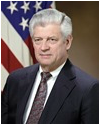Directors Emeritus

Dr. George H. Baker. Dr. Baker is Professor Emeritus, Applied Science, at Madison University, where he directed JMU’s Institute for Infrastructure and Information Assurance. Previously, Dr. Baker led the Defense Nuclear Agency's Electromagnetic Effects Vulnerability and Hardening group, directed the Defense Threat Reduction Agency’s Springfield Research Facility, and served as a senior scientist for the Congressional EMP Commission. During 2019 – 2021 he served as a staff member in the National Security Council. Dr. Baker holds an M.S. in Physics from the University of Virginia, and a Ph.D. in Engineering Physics from the U.S. Air Force Institute of Technology. He serves as a technical resource for the Foundation on critical infrastructure protection and national electromagnetic security.

Ambassador Henry F. Cooper. Ambassador Henry (Hank) Cooper was Director of the Strategic Defense Initiative Organization (SDIO) during the George H.W. Bush administration and President Reagan's Chief Negotiator at the Geneva Defense and Space Talks. Also serving as Assistant Director of the Arms Control and Disarmament Agency, he backstopped U.S. bilateral negotiations with the Soviet Union and led the development of President Reagan's space arms control policy; and, as Deputy Assistant Secretary of the Air Force, oversaw the Reagan modernization program for USAF strategic and space systems. Currently, Ambassador Cooper is Chairman of the Board of High Frontier, a non-profit, non-partisan educational corporation, formed to examine the potential for defending America against missile attack and Chairman Emeritus of Applied Research Associates, Inc. Ambassador Cooper holds a Ph.D. from New York University in Mechanical Engineering, and BS and MS degrees from Clemson University, also in Mechanical Engineering. He serves as a technical resource for Resilient Societies on matters of ballistic missile defense and international arms control.

William R. Graham. Dr. Graham was Chairman of President Reagan's General Advisory Committee on Arms Control and Disarmament from 1982 to 1985; a Deputy Administrator and Acting Administrator of NASA during 1985 and 1986; and Director of the White House Office of Science and Technology Policy and concurrently Science Adviser to President Reagan from 1986 to 1989. He chaired the statutory Commission to Assess the Threat to the United States from Electromagnetic Pulse (EMP) Attack from 2001 through 2008, which issued several reports, including a report entitled "Critical National Infrastructures" in 2008. Dr. Graham received a B.S. degree in Physics from the California Institute of Technology with Honors in 1959. In addition, he earned an M.S. degree in Engineering Science in 1961, and a PhD. in Electrical Engineering in 1963, both from Stanford University. Dr. Graham serves as a technical resource for Resilient Societies on matters of EMP protection.

William (“Bill”) R. Harris. William Harris was a director of the Foundation for Resilient Societies and Vice Chair of the National Disaster Resilience Council (NRDC). Bill first became interested in national security matters while a student at Harvard Law School, where he worked under Professor Henry Kissinger. After graduation he took a research position at the RAND Corporation where he was an international lawyer specializing in arms control, nuclear non-proliferation, energy policy, and continuity of government. He worked on Hot Line upgrades and the linked Nuclear Risk Reduction Centers (1982-84) and was a co-drafter of arms limitation treaties in 1986-87, 1991, and 1993. Within the U.S. Government, Bill’s skills were in high demand, leading him to take temporary positions with the Senate Intelligence Committee and the National Reconnaissance Office. Bill also established the National Disaster Resilience Council as a preeminent forum for critical infrastructure protection, co-authoring two editions of the book Powering Through. At the Foundation for Resilient Societies, Bill co-authored over three dozen filings to FERC, the U.S. Nuclear Regulatory Commission, and various state governments. He also served as legal counsel to the reestablished Commission to Assess the Threat to the United States from Electromagnetic Pulse Attack.

Stephen L. Mott. Mr. Mott is a co-founder of the the Foundation for Resilient Societies. He is a nuclear engineer and has 39 years of experience in the commercial nuclear power industry. Mr. Mott holds a B.S. in Nuclear Engineering from Penn State University. Mr. Mott serves as a technical resource for Resilient Societies on matters of nuclear safety.
